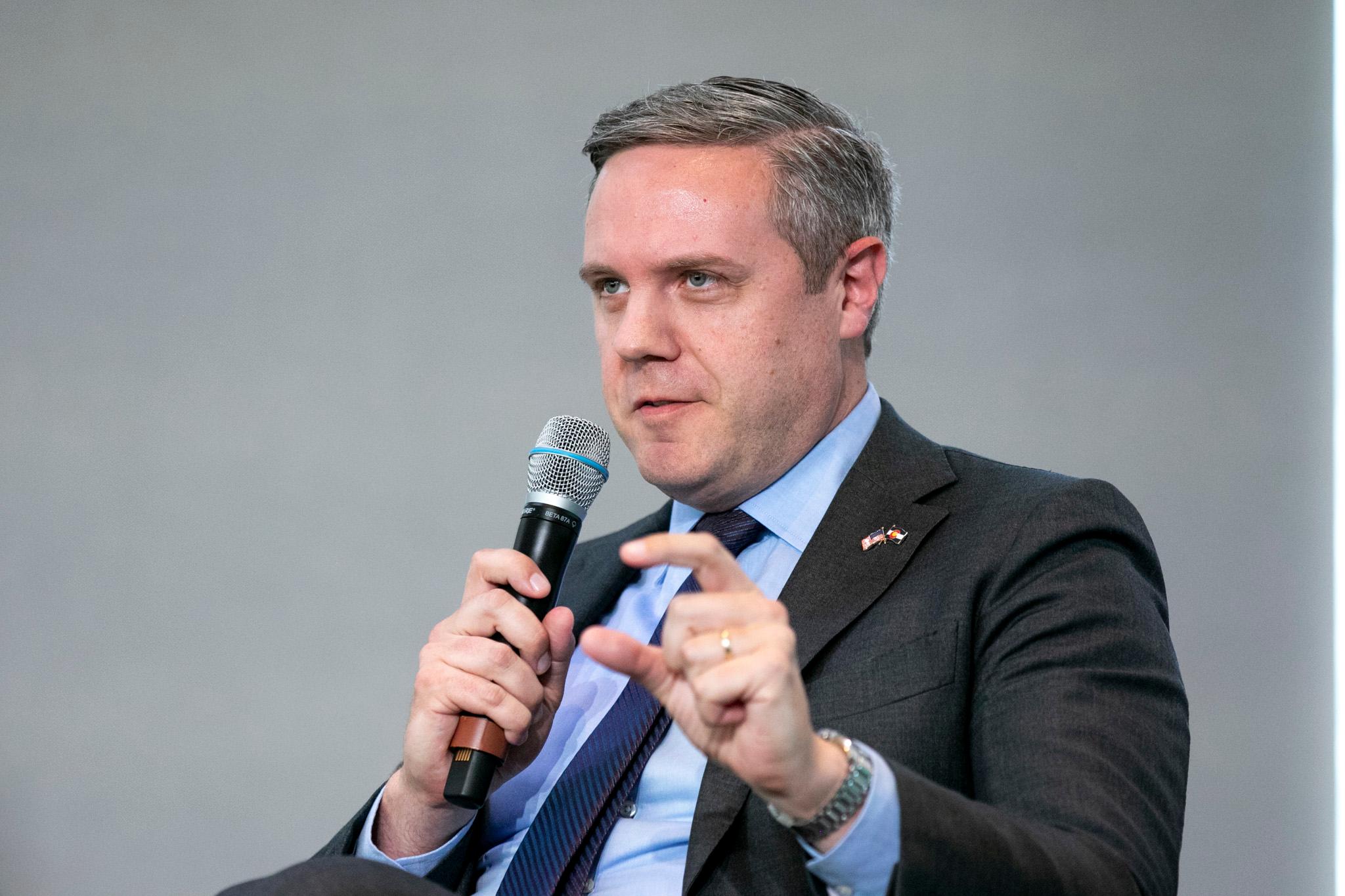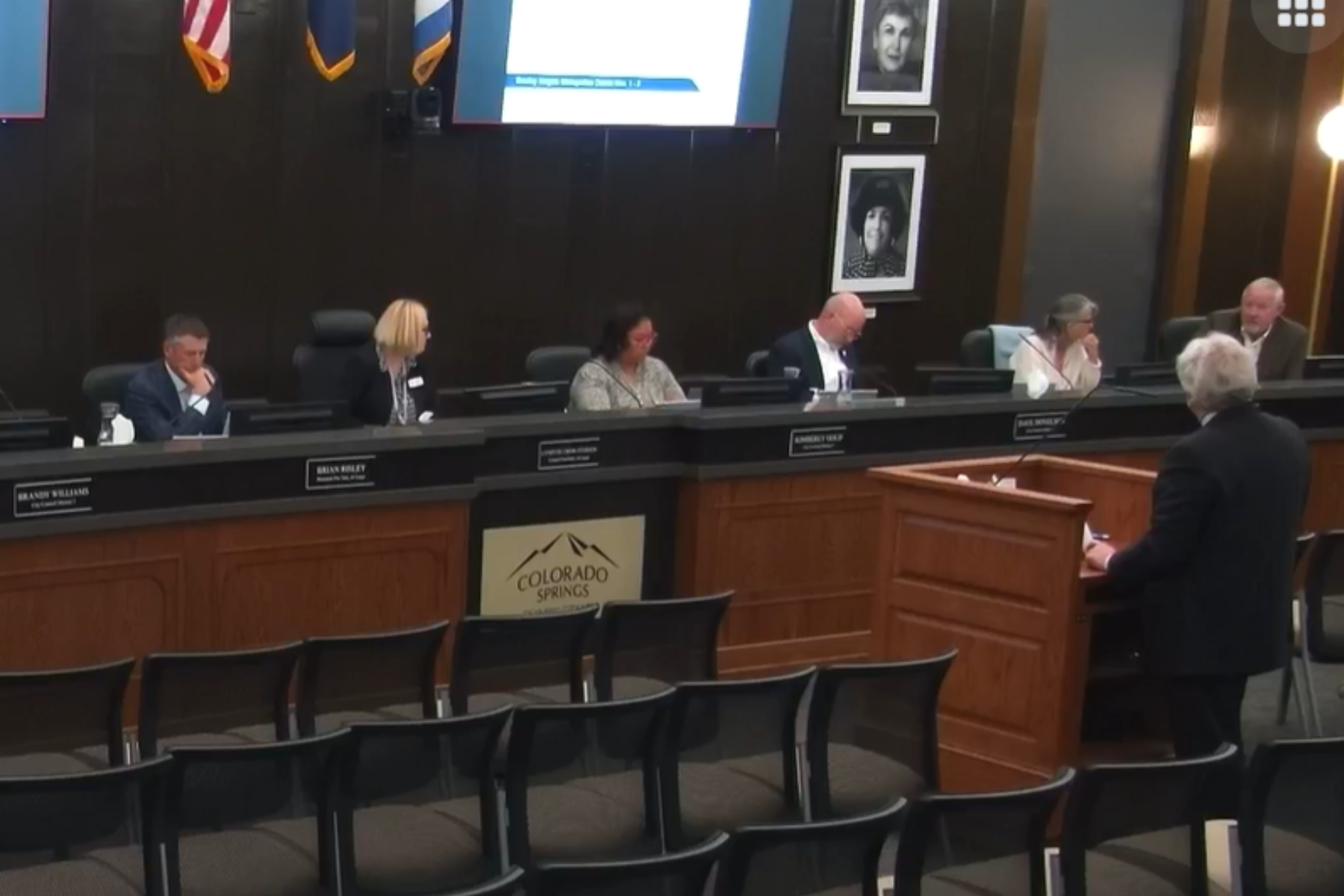
Republican Congressman Jeff Hurd is happy to discuss the enhanced premium tax credits that Democrats want funded in order to re-open the government, but not until the federal shutdown is ended.
The freshman congressman from Grand Junction supports the policy that provides federal funding to lower premium costs on the Affordable Care Act health insurance exchanges. Hurd has signed onto a bill that would extend those pandemic-era subsidies. Without them, state officials say health insurance premiums for plans purchased on Colorado’s exchange could rise anywhere from 140 percent to 330 percent in the 3rd Congressional District, which Hurd represents.
“I don't think it's right to condition opening the government on extending those enhanced premium tax credits. One of the concerns I have about what the Democrats are proposing as well, is it's an indefinite extension on the enhanced premium tax credits and I'm not sure that that's good public policy. I would look to something that's more short term,” Hurd said.
Federal shutdowns have become a recurring event in recent years, including a 2018 shutdown highlighted by a dispute about border wall funding and a 2013 shutdown in which some in Congress called to halt funding to the Affordable Care Act. Hurd says the use of federal funding as a means to influence policy discussions will lead to bad government.
“I am concerned about the way that this is being addressed and used as leveraged that the government shutdown is being used as leveraged to advance this important public policy discussion,” Hurd said, referring to the health care tax credits. “My view is we need to have that discussion. It just needs to be in the context of an open government.”
In an interview with Colorado Matters Senior Host Ryan Warner, Hurd discussed the ongoing shutdown, its impacts in his district, and how the government should address health care costs.
The congressman also addressed ongoing calls for congress to release the so-called Epstein files, a trove of documents related to the investigation and prosecution of Jeffrey Epstein. Some members of Congress have been working to do that and Hurd said he is supportive of transparency, but with caveats.
“I want this information to get out. We need to find the right mechanism to do so, and we need to make sure that we're not re-victimizing any of the victims,” Hurd said.
This interview has been edited for length and clarity
Ryan Warner: Much of this deadlock rests with the Senate, but what does it say that the House isn't in Washington ready to negotiate?
Rep. Jeff Hurd: Well, I'm not sure what there is to negotiate. We did our job. We passed the government funding bill out of the House of Representatives. It's now up to the Senate to adopt that bill and continue the government funding under a formula that's been adopted many times before on a bipartisan basis. Obviously there's a filibuster rule in the Senate, so in order for that legislation to pass, we need at least seven Democrats to join Republicans to get that legislation done. I'm not sure what things look like for the Democrats going forward. I'm concerned about what it means, though, for my district and for our country — if the government remains shut down.
Warner: What are your key concerns for the 3rd?
Hurd: Well, already I'm hearing from constituents and from the news about air traffic control delays across the country as well as in Denver International Airport, which is of course an important airport, not only for the Front Range, but for folks here in western and southern Colorado. I'm hearing about folks from Northwest Colorado who are impacted by the Lee and Elk wildfires and the inability to get response from the farm service administration, from others in the federal government about how to mitigate some of the disaster. I've been told by the (U.S. Department of Veterans Affairs) that congressional requests for assistance are not going to be (responded) to at least as quickly as they otherwise would be. That's certainly a concern as we're working on VA issues for our veteran constituents.
Warner: Democrats say that they'll vote with Republicans to end the shutdown, but only if there's an extension of tax credits that make health plans on the exchange less expensive. Representative, you've supported an extension of those credits. Why do you think it's been difficult to get other Republicans on board with this idea?
Hurd: Well, I think it's important to continue that discussion. We just need to have the discussion in the context of a government that's open, and I don't think it's right to condition opening the government on extending those enhanced premium tax credits. One of the concerns I have about what the Democrats are proposing, as well, is it's an indefinite extension on the enhanced premium tax credits, and I'm not sure that that's good public policy. I would look to something that's more short term. You're exactly right. I'm on legislation that would extend those another year. I'd be willing to look at something a little bit further, but we need to be having that discussion in the ordinary context in which the government is open.
Warner: Why can't it be now?
Hurd: Well, I don't think it's good policy to condition the funding of the government and keeping the government open on public policy issues like this. We've seen it in the past —
Warner: That’s what's fascinating to me, congressman, it's a little “Freaky Friday” because in the past it's been Democrats calling for the clean CR (continuing resolution) and Republicans putting asterisks on things. So am I hearing you say, no matter the party, this is not an approach that Congress should use?
Hurd: As a general matter, I'm not a fan of conditioning, keeping the government open (on the condition of passing) policy requests. I think the risk that we run is never-ending shutdowns that are conditioned on policy requests that aren't necessarily related to the underlying issue that is keeping the government open.
Warner: Democrats are in the minority. They have very few levers of power. Wouldn't you expect them to use the one they have?
Hurd: I think there's already sufficient pressure, particularly when it comes to things like the enhanced premium tax credits to work on a solution. Again, don't just hear me say it. Look at what I've done … on legislation, bipartisan legislation to address those issues. There are serious Republicans that are willing to work with Democrats on these issues and more importantly on the underlying cost of health care issues in our system.
Warner: And I'll just say that the numbers are astounding in the 3rd Congressional District, which you represent. So according to the Kaiser Family Foundation, more than 40,000 people in your district get their coverage through the ACA marketplace. Losing the tax credit will raise insurance premiums in your neck of the woods, anywhere from 140 percent to 330 percent according to the state, and the uninsured rate might grow 40 percent. I suppose Democrats see that as existential for families. So they're saying, “Do this now, we have no guarantee that you would do this, were the government open.” Just reflect on that before we move on.
Hurd: Well, listen, I understand the issue. It's absolutely true that the cost of insurance premiums is skyrocketing in my district, particularly those in the individual market. I think if we don't figure out a solution, we are gonna have an even more deepening crisis as the years go on, we'll have individuals that are otherwise healthy, but who are unable to afford those insurance premiums dropping out of the individual market that will lead to a a risk pool that's more unhealthy individuals and those premiums are only gonna go up more. The underlying issue, though, is the cost of health care and what is it, Ryan, that's driving those premium increases? We should be discussing that as Republicans, as Democrats, as federal legislators, as state legislators.
Warner: The Trump administration went in famously with “concepts of a plan.” The Affordable Care Act has been in the crosshairs for Republicans now for, it almost feels like a generation. Shouldn't you have a plan by now?
Hurd: Well, I think addressing the underlying drivers of cost care of, of health care is something that I'm willing to consider. Let's talk about things like regulatory mandates that are driving up administrative costs, legal and tort reforms. Doctors are practicing a lot of “defensive medicine” just to avoid lawsuits down the road. That's driving up the cost of care as well. How about switching from volume-based health care to value-based health care and incentivizing providers and insurance companies and health care consumers to make decisions that are aligned with not only their health, but also efficiency in the system?
Warner: Russell Vought is the White House budget director, and he was also the author of Project 2025. Last week, he canceled $8 billion in federal funding for energy projects. Xcel Energy is losing $70 million for battery research. A $50 million grant to a tribal energy consortium is expected to impact your district. And some speculate, this is a tactic to apply pressure or to punish Democrats. Is that your understanding?
Hurd: I don't know. You'd have to ask Russell Vought exactly what the thought process is there. I know that it was targeted.
Warner: Do you want to ask him?
Hurd: Yeah, certainly. I'd like to see exactly what the thought process was and also what the legal justification is that we want to make sure that we follow the letter of the law when it comes to these sorts of funding changes. It's important for me that the decisions that come in the appropriations process come through Congress and there is a rescissions process, but I'd like to see what it is. It's not good for stability. It's not good for predictability in our system when we have government constantly changing the rules. I complain about that when Democrats do it, and I have concerns about it when Republicans do it as well. We need to have predictability and ultimately, my view, Ryan, is we need to get the government back open and get back to working in D.C., get back to our committees and do the work that the people send us here to do.
Warner: Onto some other issues. President Trump last week addressed the nation's generals and said that they would be “a major part of straightening out cities.” “It's a war from within,” Trump added. He's also spoken frequently elsewhere of the enemy from within. Is your party at war with Americans it disagrees with?
Hurd: No, not at all. It's a war on crime. It's a war on drugs. It's a war on the fentanyl that's pouring into our communities, a war on illegal immigrants committing crimes in, in our community. That's, I think, a message that we campaigned on as Republicans, making our community safer, ensuring that law and order is in place and creating opportunities so that families can live in safety. I think it's important that we have that law and order. We are the party of law and order, and my view is any war that's going on is a war against drugs, against crime and against law and order.
Warner: You say you're the law and order party. One of the president's first acts in office was to pardon people who attacked the U.S. Capitol. Is that “violence for me but not for thee”?
Hurd: Well, I've been clear on this position that I expressed my disagreement with the president and the blanket pardon of those who attacked law enforcement officers on January 6th. I've been clear about that issue in the past, and I continue to hold that position. You know, when it comes to crime in our communities and keeping our communities safe, we do need to have a mindset that is serious, that addresses the root causes of crime. The southern border, you know, is dramatically more secure than it was a year before, but we still have fentanyl that is coming across the border through legal ports of entry that is plaguing our communities.
I actually, (it) was just yesterday, was down in Delta County talking with law enforcement in that part of my district, and they say that fentanyl is still a problem. There is still a lot of work to do when it comes to securing our border from drugs and securing our communities as well. And I don't think we can do that without the assistance and help of the federal government and law enforcement working up and down the line from the federal government to county to local police departments.
Warner: I'll note that among Colorado cities, Pueblo's homicide rate, for instance, is fairly high. Would you like to see federal troops in Pueblo?
Hurd: We need to get crime under control in Pueblo. I would look to see what leaders in Pueblo think and working with them, what law enforcement says about the best ways to address crime in Pueblo. I think one of the key issues is that we have local law enforcement that wants to work with our federal partners, and my sense is that Pueblo has a great relationship with federal law enforcement and they wanna work together. And there's certainly some state laws that are hampering that coordination with respect to illegal immigration, specifically, that are causing some issues there. But my sense is, overall, local law enforcement wants to work with federal law enforcement and, and finding the most effective ways to do that.
Is it deployment of the National Guard? I haven't heard that. I would guess that it would be more, you know, boosting funding, making sure that we have the high intensity drug trafficking area funding and collaboration with the FBI, the Department of Justice.
Warner: I think you've said something very important, which is that when I asked you the question about federal troops in Pueblo, the National Guard in Pueblo, you said it depends on what they think. May I just get you clearly on the record. When the military is deployed domestically, do you believe that the community to which they are deployed ought to have welcomed them first?
Hurd: Well, when you say the community, I mean, one of the things I would say is who are you talking to and who is speaking on behalf of the community.
Warner: The mayor, for instance. The governor.
Hurd: Yeah. I'm not sure that in some of these communities, I'm not sure that the people that are impacted by the crime and the drugs and the lawlessness are necessarily the elected officials who themselves have security and resources and the ability to affect change and to keep themselves safe. I think most people might not necessarily have that ability. I don't want to necessarily speak with any specifics. I'd have to look at the particular community that we're talking about, but certainly a willingness to be honest about the issues is important for local leadership. Be honest about the challenges, you know, to not marginalize members of the community that aren't as vocal but that are impacted by the plague of crime is something that would be important.
Warner: Does it matter if the mayor, for instance, is a Republican or Democrat?
Hurd: Does it matter how?
Warner: I mean, what we're seeing is that some of the places, many of the places that troops are being deployed are liberal places. And so there are those who think this is weaponized against blue communities.
Hurd: No, it shouldn't matter. I think the issue is the underlying crime, the underlying cooperation with law enforcement, the way in which a municipality is taking care or not taking care of public safety. I think something that we should always keep in mind when we're talking about these issues. This isn't a Republican or a Democrat issue, this is a public safety issue. It's an issue that matters to families and to small businesses and to communities throughout our country.
Warner: Do you trust the chief executive to mete this out in an equal way then in a nonpartisan way?
Hurd: I think it's important for federal law enforcement in coordination with whoever the president is, to make sure that they're following the law and targeted in a way that will ultimately lead to public safety and to addressing, you know, the underlying issues.
Warner: Congressman, you should have a new colleague from Arizona now. Adelita Grijalva was elected but has not yet been sworn in. Just as we sat down to record this, the speaker of the House says it will happen “whenever she wants.” The should-be representative thinks the delay is because of her presence leading perhaps to enough support to force a vote on releasing the so-called Epstein files. If that comes to pass, how would you vote?
Hurd: We'll have to see what happens with the new representative. I'm not sure what the timing would be and how fast this would come to the floor, but I think transparency when it comes to the Epstein files is important. We need to make sure that it's the right mechanism, though my understanding is that the discharge petition that's currently pending in the House cites the wrong federal statute. It may not protect the victims as well. I need to look at it and see before I decide on how to vote on the underlying issue; I want to get that information out. I think transparency is important, but I think we need to do it the right way. We can't re-victimize the victims of this horrible man. And we need to make sure that when we're doing it, we're citing the correct laws and doing it in the way that makes the most sense
Warner: Fundamentally. I hear you say, “I want to get that information out.”
Hurd: Correct.
Warner: Just to be crystal clear, this is not you hiding behind a technicality. This is about saying, “I want it out and we need to find the right mechanism to do so.”
Hurd: Yes, I want this information to get out. We need to find the right mechanism to do so, and we need to make sure that we're not re-victimizing any of the victims.
Warner: Months ago, we asked if you knew how many federal workers in your district had been laid off, and you, you didn't know that figure at the time. Since then, the folks that took the DOGE buyout are no longer receiving a paycheck. There have been other workers called back. There are discussions even from the White House during the shutdown that there may be more federal employees let go. Are you any closer to having a number of people affected in the 3rd Congressional District?
Hurd: The specific statistics of individuals that have taken the buyout — the “fork in the road” — versus the probationary employees that were terminated that didn't return, I haven't gotten a specific breakdown of what those numbers are. I do know that there are some of both.
Warner: Do you think federal workers have been treated with dignity?
Hurd: I think that it's important for us to make sure that government is delivering services effectively and efficiently.
Warner: Let me go back to the question, were they treated with dignity?
Hurd: Yes. I think the employees by-and-large that were offered the buyout were given an opportunity to make a choice whether or not they wanted to leave the federal government or not. And the employees that lost their position as a result of the probationary cuts that we saw had an opportunity to come back into government. Could we have maybe handled it a little differently, perhaps in certain instances? Yes. But I will tell you, talking with federal employees, that there is fat to be cut. And there are ways to make these agencies more efficient. Sometimes the tools that we have are not perfect for that task. I mean, there's civil service protections and things like that that make it harder. Talk to any federal employee, they will tell you it is very difficult to get rid of an underperforming employee. And we almost kind of go the other way.
And it's too extreme in terms of the protections that we apply to employees that aren't doing their job. I think we need to find the right balance there. Is it necessarily massive cuts? Probably that's a little (too) one end to the extreme, but also poorly performing employees should not be allowed to stay. It should not be as difficult to terminate employees that aren't doing their jobs. And so finding that middle ground, I think is something that's important. And I think most federal employees would agree, good employees should stay and employees that aren't productive, that aren't working should go.
Warner: This has just come across my desk in the last minute. We have here (that) the president has threatened to withhold back pay from federal workers who are not getting paid right now during the shutdown. What's your reaction to that?
Hurd: I'd need to see the specific comments and the legal authority that would justify that. My understanding is that, under federal law, employees that are furloughed are entitled to back pay once the government opens up. Hopefully this will become an issue that is moot very soon. I'm hopeful that our colleagues in the Senate, including my Democratic Senate colleagues here in Colorado, will vote to reopen the government and get all employees working and paid as quickly as possible.









